 鈑金製作接合
鈑金製作接合
![]()
![]()
![]()
將現有鈑金牆面結合或延伸至彎折/裂口 (顯示在「彎折/裂口」表格中),建立兩條邊線間的相關性。建立彎折或裂口之後,您可以設定或進一步定義其樣式。若要修改現有的接合,請使用修改接合。
「製作接合」特徵將現有鈑金壁結合或延伸至彎折/裂口 (顯示在「彎折/裂口」表格中),建立兩條邊線間的相關性。建立彎折或裂口之後,您可以設定或進一步定義其樣式。
按一下 Part Studio 工具列中的「製作接合」特徵。選擇要接合的相交牆的側面或邊線。如果選取了「裂口」,請選擇一個裂口樣式。「邊線接合」、「對接 - 方向 1」、或「對接 - 方向 2」。請注意,只有 90 度的接合才能使用「對接」的樣式。非 90 度的接合必須使用「邊線接合」的樣式。
如果您要改為建立彎折接合,請從下拉清單中選擇 [彎折]。在選取了「使用模型彎折半徑」的情形下,系統會使用鈑金模型特徵中的「彎折半徑」。取消核取可指定一個其他的「彎折半徑」測量值。
按一下核取記號來接受新的接合。
開始鈑金製作接合的操作:
- 在 Part Studio 中按一下
 。
。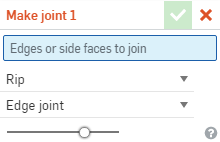
- 選擇相交牆面的邊線或側面。這個欄位需要有兩個選取項目;兩條邊線、兩個面、或一個面與一條邊線。
- 選取下列的接合類型之一:
- 彎折 - 使用彎折中心線與半徑來在面/邊線間建立一條曲線。可為半徑保留模型屬性的預設,或取消核取該方塊並指定新的彎折半徑。
- 裂口 - 在兩個鈑金邊緣交會處建立面/邊線間的關聯。選擇「裂口」時,請選擇下列的裂口邊線類型之一:
- 邊線接合 - 同時延伸兩條邊線以在其內部邊線處相交。系統會使用來自鈑金模型特徵的最小間隙來建立兩個選取項目間的間隙。
- 對接 - 方向 1 - 將所選面/邊線的外邊線相互延伸直至相交。系統會使用來自鈑金模型特徵的最小間隙來建立兩個選取項目間的間隙。僅能為 90 度的接合使用這個選項。
- 對接 - 方向 2 - 類似於方向 1,但會反轉所選面/邊線的旋向性。
- 若要將裂口轉換為彎折,請開啟鈑金表格與展開視圖
 :
:
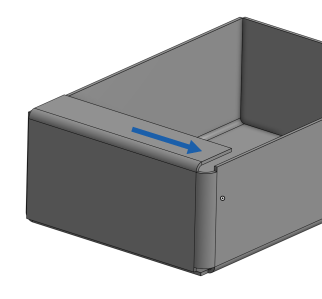
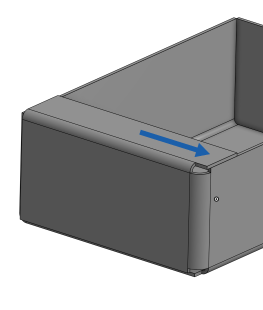
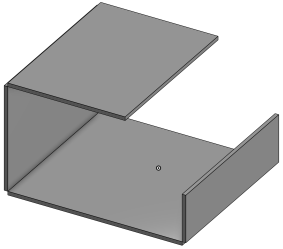
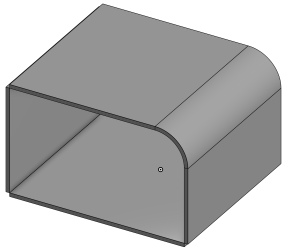
當鈑金模型啟用時 (在建立或編輯鈑金的過程中),其他可用的工具包括:
-
 凸緣 - 為每條所選的邊線建立牆面,使用彎折來連接所選的邊線。
凸緣 - 為每條所選的邊線建立牆面,使用彎折來連接所選的邊線。 -
 摺邊 - 在現有的鈑金零件上為所選取的邊線/面建立摺邊。
摺邊 - 在現有的鈑金零件上為所選取的邊線/面建立摺邊。 -
 薄板頁 - 將一個薄板頁加入至鈑金凸緣中。
薄板頁 - 將一個薄板頁加入至鈑金凸緣中。 -
 Bend - Bend a sheet metal model along a reference line, with additional bend control options.
Bend - Bend a sheet metal model along a reference line, with additional bend control options. -
 Form - Create form features on existing sheet metal models. Forms can be selected from the current document, other documents, or a predefined library of sheet metal forms.
Form - Create form features on existing sheet metal models. Forms can be selected from the current document, other documents, or a predefined library of sheet metal forms. -
 Loft - Create sheet metal models that connect two profiles.
Loft - Create sheet metal models that connect two profiles. -
 製作接合 - 將兩個牆面的相交處轉換為一個接合特徵,可以是一個彎折 (以圓柱幾何接合牆面),或是一個裂口 (兩個牆之間的小間隙)。
製作接合 - 將兩個牆面的相交處轉換為一個接合特徵,可以是一個彎折 (以圓柱幾何接合牆面),或是一個裂口 (兩個牆之間的小間隙)。 -
 轉角 - 修改轉角類型與止裂比例。
轉角 - 修改轉角類型與止裂比例。 -
 彎折止裂 - 修改彎折止裂 (在彎折結束與自由邊線交會處做出的小切除)、深度與止裂寬度。
彎折止裂 - 修改彎折止裂 (在彎折結束與自由邊線交會處做出的小切除)、深度與止裂寬度。 -
 Modify joint - Make changes to an existing joint, such as converting a bend to a rip. Currently available through the flat view table.
Modify joint - Make changes to an existing joint, such as converting a bend to a rip. Currently available through the flat view table. -
 Corner break - Break the corner on existing sheet metal parts by applying a fillet or chamfer. Select a corner edge or vertex and specify corner break type and distance. It is recommended to use this feature after all flanges and joints of the Sheet metal model are finalized.
Corner break - Break the corner on existing sheet metal parts by applying a fillet or chamfer. Select a corner edge or vertex and specify corner break type and distance. It is recommended to use this feature after all flanges and joints of the Sheet metal model are finalized. -
 Sheet metal table and flat view - Open and close the Rip/Bend tables and the visualization of the sheet metal model flat pattern. Use this table to convert rips to bends and vice versa.
Sheet metal table and flat view - Open and close the Rip/Bend tables and the visualization of the sheet metal model flat pattern. Use this table to convert rips to bends and vice versa. -
 完成鈑金模型 - 關閉 (停用) 鈑金模型;建立特徵清單中的特徵。
完成鈑金模型 - 關閉 (停用) 鈑金模型;建立特徵清單中的特徵。
開始鈑金製作接合的操作:
- 在 Part Studio 中輕觸
 。
。 - 選擇側面或相交牆面的邊線來組成裂口特徵。
- 選擇一個裂口樣式:
- 邊線接合
- 對接 - 方向 1
- 對接 - 方向 2
請注意,僅有 90° 的接合可以被造型為對接;非 90° 的接合必須是邊線接合。
- 若要將裂口轉換為彎折,請開啟鈑金表格與展開視圖
 :
:




-
 凸緣 - 為每條所選的邊線建立牆面,使用彎折來連接所選的邊線。
凸緣 - 為每條所選的邊線建立牆面,使用彎折來連接所選的邊線。 -
 薄板頁 - 將一個薄板頁加入至鈑金凸緣中。
薄板頁 - 將一個薄板頁加入至鈑金凸緣中。 -
 製作接合 - 將兩個牆面的相交處轉換為一個接合特徵,可以是一個彎折 (以圓柱幾何接合牆面),或是一個裂口 (兩個牆之間的小間隙)。
製作接合 - 將兩個牆面的相交處轉換為一個接合特徵,可以是一個彎折 (以圓柱幾何接合牆面),或是一個裂口 (兩個牆之間的小間隙)。 -
 轉角 - 修改轉角類型與止裂比例。
轉角 - 修改轉角類型與止裂比例。 -
 彎折止裂 - 修改彎折止裂 (在彎折結束與自由邊線交會處做出的小切除)、深度與止裂寬度。
彎折止裂 - 修改彎折止裂 (在彎折結束與自由邊線交會處做出的小切除)、深度與止裂寬度。 -
 Loft - View and modify sheet metal models that connect two profiles.
Loft - View and modify sheet metal models that connect two profiles. -
 Corner break - Break the corner on existing sheet metal parts by applying a fillet or chamfer. Select a corner edge or vertex and specify corner break type and distance. It is recommended to use this feature after all flanges and joints of the Sheet metal model are finalized.
Corner break - Break the corner on existing sheet metal parts by applying a fillet or chamfer. Select a corner edge or vertex and specify corner break type and distance. It is recommended to use this feature after all flanges and joints of the Sheet metal model are finalized. -
 完成鈑金模型 - 關閉 (停用) 鈑金模型;建立特徵清單中的特徵。
完成鈑金模型 - 關閉 (停用) 鈑金模型;建立特徵清單中的特徵。